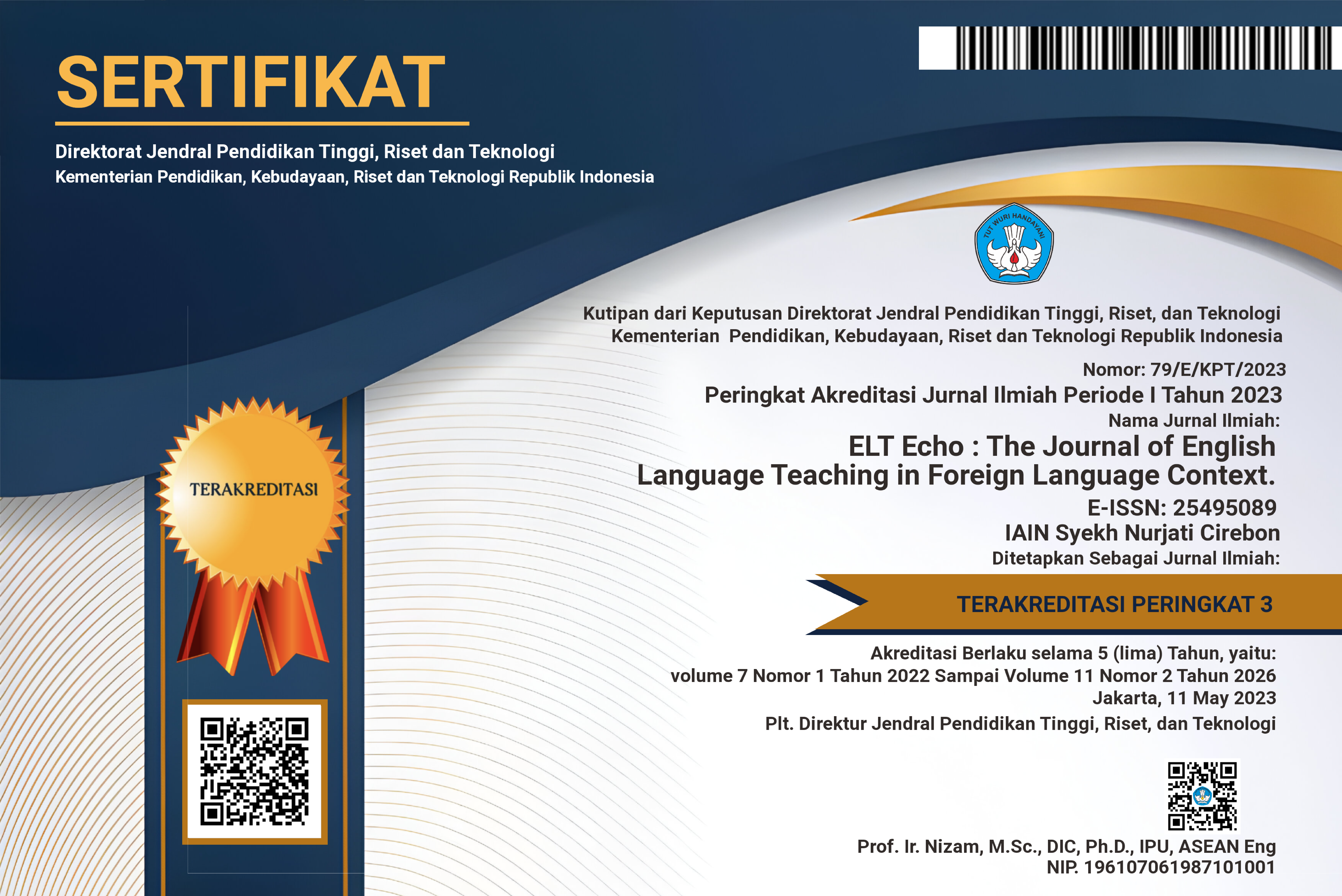THE RELATIONSHIP BETWEEN SELF-EFFICACY AND MOTIVATION IN EFL WRITING: EVIDENCE FROM AN INDONESIAN ISLAMIC UNIVERSITY
(1) Universitas Negeri Yogyakarta
(2) Universitas Negeri Yogyakarta
(3) The University of Queensland
(*) Corresponding Author
Abstract
Keywords
References
Alawneh, S. F. (1998). Human Motivation: An Islamic Perspective. American Journal of Islam and Society, 15(4), 19–39. https://doi.org/10.35632/ajis.v15i4.2153
Al-Mukdad, S. (2019). Investigating English Academic Writing Problems Encountered by Arab International University Students. Theory and Practice in Language Studies, 9(3), 300. https://doi.org/10.17507/tpls.0903.07
Amin, E. A.-R. (2019). A Correlational Study Between Some Motivational Constructs and EFL Writing Performance in a Blended Learning Environment. International Journal of English Linguistics, 9(3), 238. https://doi.org/10.5539/ijel.v9n3p238
Aziz, Z. A., Fitriani, S. S., & Amalina, Z. (2020). Linguistic errors made by Islamic university EFL students. Indonesian Journal of Applied Linguistics, 9(3), 735–748. https://doi.org/10.17509/ijal.v9i3.23224
Baig, R. (2024). THE ENGLISH LANGUAGE IN THE GULF: A LINGUA FRANCA REDEFINING IDENTITY AND OPPORTUNITY. JOURNAL OF ENGLISH LANGUAGE AND LITERATURE, 11(01), 01–04. https://doi.org/10.54513/JOELL.2024.11101
Bandura, A. (1997). Self-efficacy: The exercise of control (pp. ix, 604). W H Freeman/Times Books/ Henry Holt & Co.
Banegas, D. L., & Lowe, R. J. (2021). Creative writing for publication: An action research study of motivation, engagement, and language development in Argentinian secondary schools. Studies in Second Language Learning and Teaching, 11(3), 401–421. https://doi.org/10.14746/ssllt.2021.11.3.5
Bram, B., & Angelina, P. (2022). Indonesian Tertiary Education Students’ Academic Writing Setbacks and Solutions. International Journal of Language Education, 6(3), 267. https://doi.org/10.26858/ijole.v6i3.22043
Bruning, R., & Horn, C. (2000). Developing Motivation to Write. Educational Psychologist, 35(1), 25–37. https://doi.org/10.1207/S15326985EP3501_4
Cahyono, B. Y. (2018). Culture and Innovation in Essay Writing Project: EFL Students’ Perceptions. Theory and Practice in Language Studies, 8(11), 1433. https://doi.org/10.17507/tpls.0811.07
Cahyono, B. Y., & Rahayu, T. (2020). EFL STUDENTS’ MOTIVATION IN WRITING, WRITING PROFICIENCY, AND GENDER. TEFLIN Journal - A Publication on the Teaching and Learning of English, 31(2), 162. https://doi.org/10.15639/teflinjournal.v31i2/162-180
Cen, Y., & Zheng, Y. (2024). The motivational aspect of feedback: A meta-analysis on the effect of different feedback practices on L2 learners’ writing motivation. Assessing Writing, 59, 100802. https://doi.org/10.1016/j.asw.2023.100802
Chen, J., Zhang, L. J., & Chen, X. (2022). L2 learners’ self-regulated learning strategies and self-efficacy for writing achievement: A latent profile analysis. Language Teaching Research, 13621688221134967. https://doi.org/10.1177/13621688221134967
Cohen, J. (2013). Statistical Power Analysis for the Behavioral Sciences. Routledge.
Dianastiti, F. E., Suwandi, S., & Setiawan, B. (2024). Contributing Factors and Challenges in Mastering Academic Writing Skills: Multiple Case Studies of Deaf Students in Inclusive Universities in Indonesia. International Journal of Language Education, 8(1). https://doi.org/10.26858/ijole.v8i1.60905
Fatemi, A. H., & Vahidnia, F. (2013). An Investigation into Iranian EFL Learners’ Level of Writing Self-efficacy. Theory and Practice in Language Studies, 3(9), 1698–1704. https://doi.org/10.4304/tpls.3.9.1698-1704
Guennoun, B., & El Kholti, A. (2024). THE SIGNIFICANCE OF ENGLISH LANGUAGE PROFICIENCY IN OCCUPATIONAL HEALTH RESEARCH AND PRACTICE IN NON-NATIVE SPEAKING COUNTRIES. Occupational Medicine, 74(Supplement_1), 0–0. https://doi.org/10.1093/occmed/kqae023.0543
Haidari, S. M., Koçoğlu, A., & Kanadlı, S. (2023). Contribution of Locus of Control, Self-Efficacy, and Motivation to Student Achievement: A Meta-Analytic Structural Equation Modelling. Journal on Efficiency and Responsibility in Education and Science, 16(3), 245–261. https://doi.org/10.7160/eriesj.2023.160308
Hasanah, N. (2016, February 26). KONSEP SELF-EFFICACY DALAM AL-QUR’AN: STUDI PENAFSIRAN AYAT-AYAT SELF-EFFICACY DALAM TAFSIR AL-QUR’AN. https://www.semanticscholar.org/paper/KONSEP-SELF-EFFICACY-DALAM-AL-QUR%E2%80%99AN-%3A-STUDI-DALAM-Hasanah/c3e17cdb36dcc1efc5ed77c4caef8e591e6efd7d
Hasyim, U. A. A. (2020). Local Wisdom-based EFL Teaching: Internalizing the Values of Local Culture to Millennial Learners. Open Science Framework. https://doi.org/10.31219/osf.io/8qj5c
Hasyim, U. A. F., & Puspita, N. (2021). LOCAL WISDOM VALUES IN EFL ONLINE LEARNING: EMERGING ENVIRONTMENTAL ISSUES. Journal of English Development, 1(02), 23–34. https://doi.org/10.25217/jed.v1i02.1713
Hetthong, R., & Teo, A. (2013). Does Writing Self-efficacy Correlate with and Predict Writing Performance? International Journal of Applied Linguistics & English Literature, 2(1), 157–167. https://doi.org/10.7575/ijalel.v.2n.1p.157
Ikhwan, A. (2014). Integrasi Pendidikan Islam (Nilai-Nilai Islami dalam Pembelajaran). Ta’allum: Jurnal Pendidikan Islam, 2(2), 179–194. https://doi.org/10.21274/taalum.2014.2.2.179-194
Ingale, G. D. (2017). Techniques in Teaching Writing Skills. IUP Journal of English Studies. https://www.semanticscholar.org/paper/Techniques-in-Teaching-Writing-Skills-Ingale/63a9fb3bc89c892adb179b3f7bd70e3e3183ab3f
Izhar. (2022). Inserting Lampung Local Wisdom in Learning Indonesian Language and Its Implications on Character Education: 6th International Conference on Science, Education and Technology (ISET 2020), Semarang, Indonesia. https://doi.org/10.2991/assehr.k.211125.084
Khosravi, M., & Ghoorchaei, B. (2017). The Relationship between Writing Strategies , Self-Efficacy and Writing Ability: A Case of Iranian EFL Students. https://www.semanticscholar.org/paper/The-Relationship-between-Writing-Strategies-%2C-and-%3A-Khosravi-Ghoorchaei/cd1d99fdeb7e280aa7ad2bfe082b345555b4d175
Li, J., Wang, C., & King, R. B. (2024). Which comes first? Modeling longitudinal associations among self-efficacy, motivation, and academic achievement. System, 121, 103268. https://doi.org/10.1016/j.system.2024.103268
Listyani, L. (2022). Exploring Indonesian EFL Writing Students’ Differences in Motivation: A Language Learning Journey to Success. Journal of Language Teaching and Research, 13(2), 406–416. https://doi.org/10.17507/jltr.1302.23
Majahar, F., Ahmad H. Osman, R., Pauzi, S. N. A., & Aziz, S. A. (2021). Learning Motivation from Islamic Perspective: دافعية التعلم في ضوء الإسلام. Al Hikmah International Journal of Islamic Studies and Human Sciences, 4(Special Issue), 1–26. https://doi.org/10.46722/hkmh.4.si.a21
Muhammad Ainul Yaqin & David Ari Setyawan. (2024). PERAN GURU BIMBINGAN KONSELING ISLAM DALAM MENINGKATKAN MOTIVASI BELAJAR SISWA. Counseling For All (Jurnal Bimbingan Dan Konseling), 4(1), 37–45. https://doi.org/10.57094/jubikon.v4i1.1293
Mujahid, K., & Muharromah, F. (2025). Pola Pikir Growth Mindset dalam Perspektif Nilai-nilai Islam. TSAQOFAH, 5(1), 1054–1063. https://doi.org/10.58578/tsaqofah.v5i1.4697
Pae, H. K., & O’Brien, B. (2018). Overlap and Uniqueness: Linguistic Componential Traits Contributing to Expressive Skills in English as a Foreign Language. Reading Psychology, 39(4), 384–412. https://doi.org/10.1080/02702711.2018.1443298
Postgraduate student, State University of Malang, Biology Education Program, Islamic State University of Mataram, Indonesia, niningpurwati77@gmail.com, Purwati, N., Zubaidah, S., Prof., Departement of Biology, State University of Malang, Indonesia, siti.zubaidah.fmipa@um.ac.id, Corebima, A. D., Prof., Departement of Biology, State University of Malang, Indonesia, durancorebima@gmail.com, Mahanal, S., & Dr., Departement of Biology, State University of Malang, Indonesia, susriyati.mahanal.fmipa@um.ac.id. (2018). Increasing Islamic Junior High School Students Learning Outcomes through Integration of Science Learning and Islamic Values. International Journal of Instruction, 11(4), 841–854. https://doi.org/10.12973/iji.2018.11453a
Prihandoko, L. A., Nurkamto, J., & Djamika. (2024). PLS-SEM MULTI GROUP ANALYSIS: UNCOVERING THE INTERPLAY OF FACTORS AFFECTING ACADEMIC WRITING SELF-EFFICACY OF EFL POSTGRADUATE STUDENTS. TEFLIN Journal - A Publication on the Teaching and Learning of English, 35(2), 305–329. https://doi.org/10.15639/teflinjournal.v35i2/305-329
Rana, M. S., & Shaikh, R. (2024). The Role of English Speaking- Skills in Career Progression: A Case Study among Sudanese Undergraduate EFL Students. World Journal of English Language, 14(2), 349. https://doi.org/10.5430/wjel.v14n2p349
Romrome, A. Y., & Mbato, C. L. (2022). Exploring EFL students’ motivation in essay writing through writing beliefs, self-efficacy, and attitudes: A case from Papua, Indonesia. Journal on English as a Foreign Language, 13(1), 1–24. https://doi.org/10.23971/jefl.v13i1.4561
Ryan, R. M., & Deci, E. L. (2000). Self-determination theory and the facilitation of intrinsic motivation, social development, and well-being. American Psychologist, 55(1), 68–78. https://doi.org/10.1037/0003-066X.55.1.68
Sabti, A. A., Md Rashid, S., Nimehchisalem, V., & Darmi, R. (2019). The Impact of Writing Anxiety, Writing Achievement Motivation, and Writing Self-Efficacy on Writing Performance: A Correlational Study of Iraqi Tertiary EFL Learners. Sage Open, 9(4), 2158244019894289. https://doi.org/10.1177/2158244019894289
Salikin, H. (2019). Factors affecting male and female Indonesian EFL students’ writing anxiety. Indonesian Journal of Applied Linguistics, 9(2). https://doi.org/10.17509/ijal.v9i2.20229
Setyowati, L., Mujaddidah, A., Sukmawan, S., & El-Sulukiyyah, A. A. (2020). COMPARING THE HIGH AND LOW ACHIEVER STUDENTS’ DIFFICULTIES IN LEARNING WRITING DURING REMOTE LEARNING. Academic Journal Perspective : Education, Language, and Literature, 8(2), 107–121. https://doi.org/10.33603/perspective.v8i2.4074
Sinaga, Y. S., & Subekti, A. S. (2024). Interaction Between Self-Efficacy and Instrumental Motivation among Indonesian L2 Learners of English. Langkawi: Journal of The Association for Arabic and English, 83. https://doi.org/10.31332/lkw.v0i0.7828
Staples, S., Egbert, J., Biber, D., & Gray, B. (2016). Academic Writing Development at the University Level: Phrasal and Clausal Complexity Across Level of Study, Discipline, and Genre. Written Communication, 33(2), 149–183. https://doi.org/10.1177/0741088316631527
Subandowo, D., & Sárdi, C. (2023). Academic essay writing in an English medium instruction environment: Indonesian graduate students’ experiences at Hungarian universities. Ampersand, 11, 100158. https://doi.org/10.1016/j.amper.2023.100158
Sudirman, A., Gemilang, A. V., & Kristanto, T. M. A. (2021). The power of reflective journal writing for university students from the EFL perspective. Studies in English Language and Education, 8(3), 1061–1079. https://doi.org/10.24815/siele.v8i3.19105
Sujecka-Zając, J. (2024). Poczucie własnej skuteczności studentów w rozwijaniu sprawności pisania w języku obcym. Neofilolog, 62/1, 24–42. https://doi.org/10.14746/n.2024.62.1.3
Sun, T., & Wang, C. (2020). College students’ writing self-efficacy and writing self-regulated learning strategies in learning English as a foreign language. System, 90, 102221. https://doi.org/10.1016/j.system.2020.102221
Taufik Hidayat, M. (2024). English Language Proficiency and Career Opportunities: Perceptions of Indonesian University Graduates. Language Value, 17(1). https://doi.org/10.6035/languagev.7933
Teng, M. F., & Wang, C. (2023). Assessing academic writing self‐efficacy belief and writing performance in a foreign language context. Foreign Language Annals, 56(1), 144–169. https://doi.org/10.1111/flan.12638
Thresia, F. (2015). INTEGRATING LOCAL CULTURE TO PROMOTE CHARACTER EDUCATION IN TEACHING WRITING. PREMISE JOURNAL:ISSN Online: 2442-482x, ISSN Printed: 2089-3345, 4(2). https://doi.org/10.24127/pj.v4i2.303
Universitas Muhammadiyah Prof. DR. HAMKA, Mulyono, H., & Artarini, S. (2021). Direct and Indirect Supports in an EFL Academic Writing Classroom: New Rhetorical Genre Perspective. Mextesol Journal, 45(4), 1–6. https://doi.org/10.61871/mj.v45n4-18
Ushioda, E. (2011). Language learning motivation, self and identity: Current theoretical perspectives. Computer Assisted Language Learning, 24(3), 199–210. https://doi.org/10.1080/09588221.2010.538701
Vula, E., Tyfekçi, N., & Biblekaj, L. (2024). Strategies for Enhancing ESL Writing Proficiency: Insights from a Pre-University Educational Setting. Journal of Educational and Social Research, 14(6), 367. https://doi.org/10.36941/jesr-2024-0179
Xu, W., Zhao, P., Yao, Y., Pang, W., & Zhu, X. (2023). Effects of self-efficacy on integrated writing performance: A cross-linguistic perspective. System, 115, 103065. https://doi.org/10.1016/j.system.2023.103065
Zhang, D., Tan, J. T. A., & Sinha Roy, S. (2023). A Systematic Review of Interventions Improving University Students’ EFL Writing Competence. International Journal of Learning, Teaching and Educational Research, 22(10), 93–112. https://doi.org/10.26803/ijlter.22.10.6
DOI: 10.24235/eltecho.v10i1.19988
Article Metrics
Abstract view : 20 timesRefbacks
- There are currently no refbacks.
Â
This Journal is indexed by:
Â

This work is licensed under a Creative Commons Attribution 4.0 International License.










